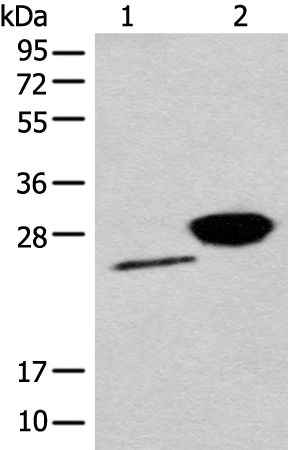
| WB | 咨询技术 | Human,Mouse,Rat |
| IF | 咨询技术 | Human,Mouse,Rat |
| IHC | 咨询技术 | Human,Mouse,Rat |
| ICC | 技术咨询 | Human,Mouse,Rat |
| FCM | 咨询技术 | Human,Mouse,Rat |
| Elisa | 1/5000-1/10000 | Human,Mouse,Rat |
| Aliases | ARHI; NOEY2 |
| WB Predicted band size | 26 kDa |
| Host/Isotype | Rabbit IgG |
| Antibody Type | Primary antibody |
| Storage | Store at 4°C short term. Aliquot and store at -20°C long term. Avoid freeze/thaw cycles. |
| Species Reactivity | Human, Rat |
| Immunogen | Fusion protein of human DIRAS3 |
| Formulation | Purified antibody in PBS with 0.05% sodium azide and 50% glycerol. |
+ +
以下是关于DIRAS3抗体的3篇参考文献及其摘要概括:
---
1. **文献名称**: *DIRAS3 (ARHI) inhibits tumorigenesis through autophagy and apoptosis in ovarian cancer*
**作者**: Lu, Z., et al.
**摘要**: 该研究利用DIRAS3抗体检测其在卵巢癌细胞中的表达,发现DIRAS3通过诱导自噬和凋亡抑制肿瘤生长,其低表达与卵巢癌患者预后不良相关。
---
2. **文献名称**: *Epigenetic silencing of DIRAS3 promotes breast cancer progression by activating EGFR signaling*
**作者**: Zhou, J., et al.
**摘要**: 通过DIRAS3抗体的免疫组化分析,作者发现乳腺癌中DIRAS3因启动子甲基化而表达沉默,其缺失导致EGFR信号通路异常激活,促进肿瘤侵袭和转移。
---
3. **文献名称**: *DIRAS3 regulates autophagy and mTOR signaling in pancreatic cancer*
**作者**: Fujii, S., et al.
**摘要**: 研究使用DIRAS3抗体进行Western blot和免疫荧光实验,证明DIRAS3通过抑制mTOR通路调控胰腺癌细胞的自噬活性,其过表达可显著抑制肿瘤增殖。
---
4. **文献名称**: *DIRAS3 modulates the cytoskeleton and migration of glioma cells via Rho GTPase pathways*
**作者**: Bavelloni, A., et al.
**摘要**: 通过DIRAS3抗体的免疫沉淀技术,研究发现DIRAS3通过与Rho GTPases相互作用调控胶质瘤细胞骨架重排和迁移能力,提示其作为潜在治疗靶点。
---
这些文献均涉及DIRAS3抗体的实验应用,涵盖肿瘤抑制机制、表观遗传调控及信号通路研究。
DIRAS3. also known as ARHI (aplasia Ras homolog member I), is a maternally imprinted tumor suppressor gene belonging to the Ras superfamily of small GTPases. Unlike most Ras family members that promote cell growth, DIRAS3 functions as a tumor suppressor by inhibiting proliferation, survival, and motility while promoting autophagy and apoptosis. It is expressed in normal tissues but frequently downregulated in cancers, including ovarian, breast, and pancreatic carcinomas, often through epigenetic silencing (e.g., promoter methylation) or loss of imprinting.
DIRAS3 antibodies are essential tools for studying its expression, localization, and functional roles in cancer biology. These antibodies enable detection of DIRAS3 protein via techniques like Western blotting, immunohistochemistry (IHC), and immunofluorescence (IF). Research using DIRAS3 antibodies has revealed its involvement in autophagy-mediated tumor dormancy and its potential as a therapeutic target. For instance, DIRAS3 re-expression can induce autophagy and inhibit the PI3K/AKT/mTOR pathway, sensitizing cancer cells to chemotherapy.
The development of specific, high-affinity DIRAS3 antibodies has advanced studies on its tumor-suppressive mechanisms and clinical relevance, particularly in understanding resistance mechanisms and designing combination therapies. Validation of these antibodies remains critical due to DIRAS3’s low molecular weight (~26 kDa) and sequence homology with other Ras family proteins.
×